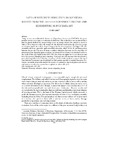Rates of return to education in Botswana: results from the 2002/2003 household income and expenditure survey data set

View/
Date
2008Author
Siphambe, H.K.
Publisher
Blackwell Publishing Ltd, www.blackwellpublishing.comType
Published ArticleMetadata
Show full item recordAbstract
Using the most recent Household Income and Expenditure Survey data (2002/2003), this paper presents current rates of return to education for Botswana. The results show that the rates of return
have in general declined by one percentage point on average between the periods as shown in
Table 2. If we, however, look at the averages for the different school cycles, the fall in the average
rates is quite significant at about six percentage points between the periods. The biggest fall is for
secondary education, especially upper secondary education, which fell by 28 percentage points
between the periods. The rates of return to tertiary education, however, rose by more than 50
percentage points. Ignoring upper secondary, the pattern of rates of return has remained similar to the results of the study based on the 1993/1994 data. Rates are higher for tertiary education and
lower for secondary than for primary education. This results are still consistent with rates of return
generally rising with level of education. At policy level, the results continue to support sharing of
costs between Government and beneficiaries or their parents especially at tertiary education level. Second, the results indicate the need for the country to continue to vigorously pursue job creation
and reorient the education system from emphasis on white collar jobs.
